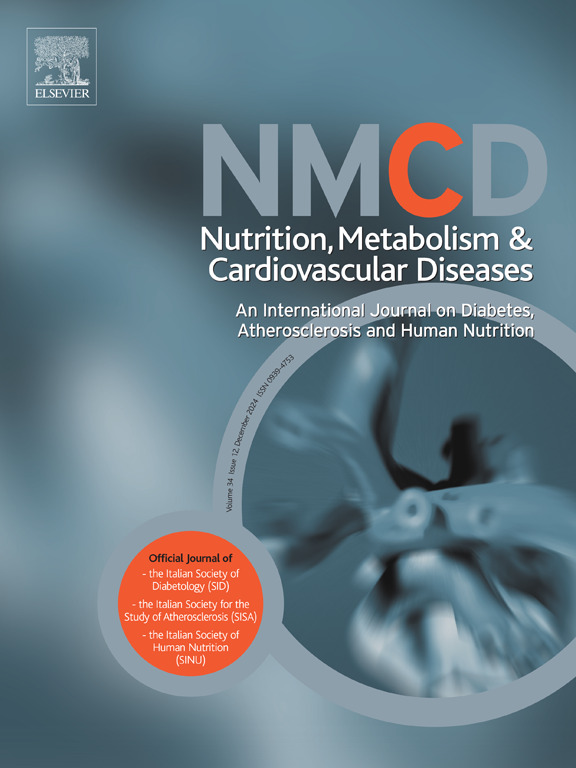Social isolation and loneliness in non-communicable chronic diseases: Impact of COVID-19 pandemic, population aging and technological progress
IF 3.3
3区 医学
Q2 CARDIAC & CARDIOVASCULAR SYSTEMS
Nutrition Metabolism and Cardiovascular Diseases
Pub Date : 2025-03-15
DOI:10.1016/j.numecd.2025.104015
引用次数: 0
Abstract
Aims
Social isolation and loneliness have increasingly emerged as closely linked to onset and progression of non-communicable chronic diseases (NCDs). The aim of this review is to highlight the importance of addressing social isolation in the prevention and management of NCDs such as obesity, type 2 diabetes, and cardiovascular diseases in order to hinder their development and improve their outcomes.
Data synthesis
Social isolation and loneliness affect a significant portion of the older adult population, due to decrease in social interactions, chronic illnesses and sensory impairments. However, many other vulnerable populations may experience social isolation because of psychiatric or disabling health conditions, substances abuse, low socioeconomic status, unemployment and belonging to ethnic or marginalized minorities.
The unprecedented COVID-19-related social distancing can be taken as a proof-of-concept of the detrimental role of poor interactions in NCDs prevention and management not only at individual level but also in a public health perspective. Indeed, social isolation has been linked to unhealthy lifestyle choices, disrupted sleep quality, low utilization of healthcare, preventive services and adherence to treatments. Underlying mechanisms like inflammation and stress responses may also play a role in the association between social isolation and worse NCDs outcomes.
Conclusions
Social isolation negatively impacts on the development, progression and management of NCDs. Effective interventions for social isolation should address both societal factors and healthcare-related needs. To counteract the detrimental effects of social distancing during COVID-19 pandemic, the use of telemedicine was implemented. However, telemedicine is not always available, and legislative and age-related barriers persist.
非传染性慢性病中的社会隔离和孤独:COVID-19 大流行、人口老龄化和技术进步的影响。
目的:社会孤立和孤独日益与非传染性慢性疾病的发病和发展密切相关。本综述的目的是强调解决社会隔离在预防和管理非传染性疾病(如肥胖、2型糖尿病和心血管疾病)中的重要性,以阻碍其发展并改善其结局。数据综合:由于社会交往减少、慢性疾病和感觉障碍,社会孤立和孤独影响着很大一部分老年人口。然而,许多其他弱势群体可能由于精神或致残健康状况、滥用药物、低社会经济地位、失业以及属于族裔或边缘少数群体而遭受社会孤立。与covid -19相关的前所未有的社交距离可以被视为一种概念证明,不仅在个人层面,而且从公共卫生的角度来看,不良互动在非传染性疾病预防和管理中的有害作用。事实上,社会孤立与不健康的生活方式选择、睡眠质量中断、保健、预防服务的利用率低以及坚持治疗有关。炎症和应激反应等潜在机制也可能在社会孤立与更严重的非传染性疾病结果之间的关联中发挥作用。结论:社会隔离对非传染性疾病的发生、发展和管理有负面影响。针对社会隔离的有效干预措施应同时解决社会因素和保健相关需求。为抵消COVID-19大流行期间保持社交距离的不利影响,实施了远程医疗。然而,远程医疗并不总是可用的,立法和年龄相关的障碍仍然存在。
本文章由计算机程序翻译,如有差异,请以英文原文为准。
求助全文
约1分钟内获得全文
求助全文
来源期刊
CiteScore
6.80
自引率
2.60%
发文量
332
审稿时长
57 days
期刊介绍:
Nutrition, Metabolism & Cardiovascular Diseases is a forum designed to focus on the powerful interplay between nutritional and metabolic alterations, and cardiovascular disorders. It aims to be a highly qualified tool to help refine strategies against the nutrition-related epidemics of metabolic and cardiovascular diseases. By presenting original clinical and experimental findings, it introduces readers and authors into a rapidly developing area of clinical and preventive medicine, including also vascular biology. Of particular concern are the origins, the mechanisms and the means to prevent and control diabetes, atherosclerosis, hypertension, and other nutrition-related diseases.

 求助内容:
求助内容: 应助结果提醒方式:
应助结果提醒方式:


